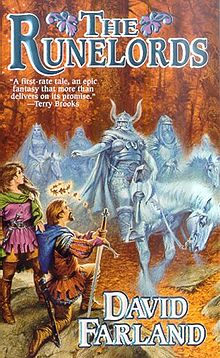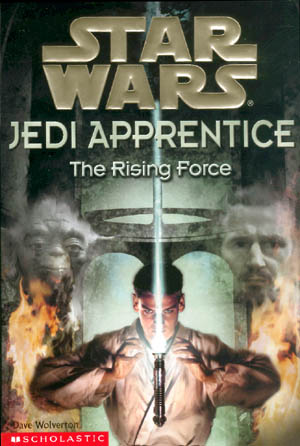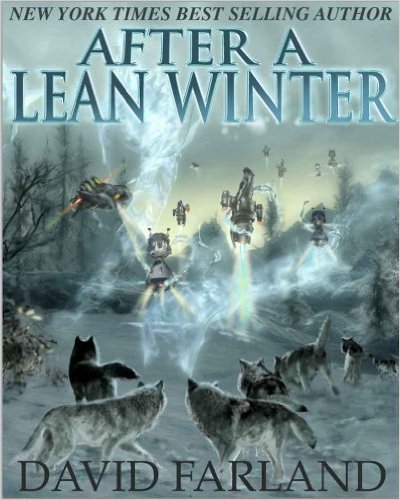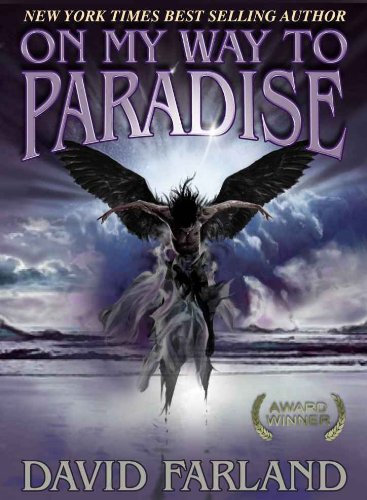Inside the Mind of The Runelords Author
Dave Wolverton is an award-winning science fiction author who also goes under the pseudonym David Farland for his fantasy works. He’s best known for his Runelords series. As an English professor, he taught such famous writers as Brandon Sanderson, Brandon Mull, Jessica Day George, Eric Flint, and James Dashner. LDS.net was honored with the opportunity to interview him.
LDS.net: What’s your process for writing your books?
Dave: Well, it’s kind of complex. The truth is that when you start thinking about a book, you get a lot of different ideas. A lot of people think you’ve got just one idea for a book, but you’ve got to come up with ideas for characters. You’ve got to create the world, come up with ideas for conflict. You’ve got to decide how you’re going to go about it. Choose the style of prose you might take. There’s literally dozens or hundreds of artistic considerations you take before you ever start writing a book. Typically, I decide that I want to write a specific kind of story. If I’m writing fantasy, I try to probably sit down and start creating my world first. Creating various geographies, how many moons does it have, questions like what’s the actual practical feature of the planet. Things like that. Then I get into deciding what kind of creatures live there.

If there’s a magic system. From the world and characters combined, you find what types of conflicts come up. Political conflicts, religious, nature, you know, volcanoes erupting and things like that. Those conflicts then lead me to ideas of how am I going to plot this book? So, I’ll come up with a plot. I’ve got my characters and a plot and then think of what themes I want to address. What’s the larger issue of the book. Do I want to be considering? I do all of that and then sit down and begin writing. A lot of times throughout the writing process I’ll write the opening and then try it a few different times. Eventually I get to somewhere I like, get some pages written I like, and then the story unfolds pretty easily and naturally thereafter.
There’s not really process that’s set in stone. Sometimes you get a pretty cool idea for a character and that sets off to become a novel or book. So, it’s really a complex process. There’s no easy way to describe it.
LDS.net: Have you ever felt like you’re divinely inspired or guided?
Dave: You know, I’m going to be honest, I don’t really feel like… There are certain things that come together naturally, but I don’t believe that I get a feeling that God wants me to write this or do something like that. I don’t feel that directed. I certainly feel it in other aspects of my life, but my writing is pretty much my writing. I see people from time to time that say, “I feel inspired to write this” and then you see the incredibly bad work that they do and go, “I’m not sure why He told you to do that.” I worry that people can get self-diluted about that. So, certainly what I am doing is I’m writing for SF/Fiction/Fantasy fans.
My biggest objective is to entertain them and that they have a good time and hopefully teach them something sometimes. I don’t sit down and say, “I’m going to teach them something about pornography and how you need to avoid it”, or something like that. I let the themes arise naturally from the conflicts that come up. Sometimes I surprise myself. I’ll be writing and say, “Oh, the characters are dealing with this moral issue and my characters are thinking a lot about it, maybe I need to talk about it.” There have been times in that process that in pondering a topic I feel inspired that, “Yeah. I’ve got the right one. This is what I would want to say here.” You know, I feel like I stumble upon revelation rather than having it thrown at me.
As a Mormon, I feel like you know the gospel has the answer to life’s questions. We may not have figured out exactly what questions to ask, or what the answers mean in their entirety and things like that. But we get little hints that very often, gosh, I’ll be in Sunday school or something like that and someone will say something that relates to my current book in progress and I go, “Oh yeah, this is going to change the plot so I can get that principle across.”
It’s kind of a lot of things. It’s not like I feel like I’m being guided by the hand. It’s like I’m walking around in the dark and every once in a while, I’m getting nudged in the right direction.
LDS.net: Do you feel like pieces or nuggets of truth come out in the writing naturally?
Dave: I think that’s it most of the time. There have been times when people have asked me questions and asked for my opinion and I’ve felt like I’m inspired to say something to help them I normally wouldn’t have said. That  takes me by surprise. I don’t want to get into it too much, but there are a couple of big name authors who have multimillion dollar careers that I’ve been able to advise and I’m always surprised at how right I am. (laughs)
takes me by surprise. I don’t want to get into it too much, but there are a couple of big name authors who have multimillion dollar careers that I’ve been able to advise and I’m always surprised at how right I am. (laughs)
I have had the opportunity to help steer a few people in the right direction. Stephanie Meyer came into my class and asked how to write the bestselling novel of all time I thought, “I can’t write this book because I’m an old man and it wouldn’t be the kind of book my readers would want.” I said, “If I were you and a twenty something woman I could write a romance.” We sat down and talked about what would eventually become Twilight.
LDS.net: Do you ever feel like it’s hard to be Mormon and be out in the public eye?
Dave: I don’t really feel that way to be honest. I kind of look at it as, as an author I feel like I’m invisible anyway. It’s not like you’re a movie star and in front of the camera all the time, you write a book and you’re kind of behind the scenes. There are people who might dislike Mormons who have tried to “out” me. There’s always been those kinds of people in all ages, and it doesn’t matter what religion you belong to, there’s going to be people who dislike it —your values and beliefs. You can’t really worry about that too much.
Truth is, overall I think I’m a pretty moderate person. It’s sort of like I decided many years ago not to drink and I didn’t join the Church until a couple years afterwards. But I did not drink or do drugs when I set my own standards. So, I’ve never felt like the Church forces its standards on me. I kind of accepted them before I ever heard about the Church. So, there are people from time to time that say, You’re Mormons and you can’t do this or can’t do that. And I say, “That’s all true, but at the same time, I don’t’ care if someone else lives my standards. I don’t’ mind if other people never touch a drop of coffee.” I’m pretty liberal about it. As far as the WoW goes, we have to take care of our own health. I’m pretty much a vegan nowadays and I don’t eat gluten and I don’t drink coffee or alcohol. It’s sort of a natural thing. Most people are pretty respectful about that kind of thing. I don’t really worry about it too much.
LDS.net: You met with the missionaries when you were 15. What was your experience with reading the BOM?
Dave: I sat down when I was 13 and made up my rules of living. I decided if I was going to be a happy person, these were things I was going to do. That included avoiding drugs and alcohol and not smoking and refraining from sexual activity until I was married. I sort of became this monastic type of kid pretty young. (Laughs) And then when the Church came along I looked at the BOM and talked to missionaries and the doctrine made sense to me.
Whereas I have to admit I belonged to a couple of churches that didn’t make sense to me before that. I would listen to something the preachers said and would say, “that’s just insane. That’s illogical and doesn’t work.” The idea, for example, that with Mormons we are God’s children and He loves us and He has a plan for us of things we can do to be happy, and by the way if you talk to Him, He’ll  answer you—all those things really made sense to me. So, I was a pretty easy convert in that sense. I had probably a lot more questions than the average 15 year old does, but it was pretty easy for me to make the decision.
answer you—all those things really made sense to me. So, I was a pretty easy convert in that sense. I had probably a lot more questions than the average 15 year old does, but it was pretty easy for me to make the decision.
Once I’d decided to join the Church, then I started getting a little bit of a kickback. My parents weren’t members, their church had me talk to a number of different priests. When I went to get baptized the Stake President was worried that I hadn’t asked my parents’ permission to be baptized. I quoted him the scripture Jesus said, “if you love mother father… more than me…” you are not worthy of me.” if you don’t want to baptize me, I’ll just leave home until you do it. (Laughs) I was a pretty easy convert in some ways and a lot more bull-headed I guess.
LDS.net: What advice would you give to a new convert? Someone who just got baptized yesterday.
Dave: That’s an interesting question. I really feel it’s like diving into cold water. You can if you want go and stick your toe in and see how cold it is, but it’s not going to do you a lot of good. It’s better to just dive in. I think, gosh, beyond that, I joined the Church and met and made really good friends. I don’t feel like I had any real problems adjusting or things like that. I had already been living the commandments, but the thing I felt when I first joined the Church was that I felt that I didn’t know as much as other members. I hadn’t gone through Sunday school or seminary or something like that. So, I did a lot of reading and studying to find out what Mormons really do believe. If you read enough, there’s quite a bit of variation. You look at one authority and one will have a different opinion than another. But, 97% of us see things the same and agree on most of the same standards.
LDS.net: What’s the best piece of advice you’ve ever been given?
Dave: Best piece of advice I’ve ever been given? The problem with that is this, every writer is different. Every artist has something different that they need to learn. I put out my advice column. I put it out a couple times a week. Yesterday, I got maybe 5 or 6 letters from people saying, “this is exactly what I needed to hear today.” I give a completely different piece of advice tomorrow and get a half a dozen people saying the same thing. I think some of the best advice I ever got was from my writing teacher, Eloise Bell. It was in one of my writing classes and she said, “Don’t be afraid to try and write a good story.”
In other words, a lot of people want to write a book but they’re afraid to really throw themselves into it and make it as big and powerful as they can. I want to make sure that with every book that I give it my best effort. But, you need to pour your heart into your work no matter what you’re doing. You have to write with passion, with depth, you have to be odd, and you have to let everything else take care of itself.
You need to write what you love to write. I love fantasy. If I were to try to write contemporary comedy… I don’t read those books. It’s not that I don’t like comedy; I watch comedy movies, but I don’t read that literature for fun and my heart doesn’t soar with joy at the thought of writing one of those books. The same way if I were to try to write a historical novel about ancient Syrian culture. I don’t have a love for Syrian culture and it doesn’t interest me too much. I’ve got to write the ones that I love.
LDS.net: Do you feel like that same principle can carry over into your life with “do what you love” or “be what you want to be?”
Dave: Oh yeah. I’ve had a rule for a while now about my writing. I’ve worked in movies and video games and novels and done a lot of things. I have two rules. One of them is that I have to make enough money to make it worthwhile. The other thing is it’s got to be really fun. If  a project looks like it’s going to be really fun I might do it for less money, but I don’t want to (laughs).
a project looks like it’s going to be really fun I might do it for less money, but I don’t want to (laughs).
Or, if it doesn’t look fun , then I just say no. For example, I love the series Star Trek and I kept having the editors of the Star Trek books coming to me and asking if I would write a Star Trek book.
I kept saying, “Yeah, if I can write it about Dr. Spock and Captain Kirk,” those are still my two favorite characters, who I grew up loving as a kid. And they’d say, “No, no, no. You’ve got to do a next generation book, but we’ll pay you twice as much as we’ll pay anybody else.” And I’d say, “Nope!” Because that wouldn’t have been fun. It would have felt like I was out digging post holes or something. So, I turn down lucrative projects on a fairly regular basis and I do non-lucrative things. I’m not going to die poor (laughs). I think, “that sounds fun, let’s go do that and not make as much money.”
LDS.net: With all the uncertainty in the world, what would you say to people to give them comfort?
Dave: I read a quote awhile ago from David O. Mckay that said, “Live the gospel, abide by your principles, do what you know is right and all will be well with you.” And I just thought, you know, that’s really it. You don’t need to follow all of these stock market analysts. My neighbors aren’t going to eat me. I’ve got some really nice neighbors. I’m not going to be stockpiling weapons. They can stockpile weapons if they want. You know, in case we need to protect ourselves from marauding Californians we can go out there and put out a good fight. So, I just don’t worry about it. Take care about the big things and don’t worry too much about the little ones.
There has always been signs of the times. Just go back historically and take any year you want, I wrote a book set in 1856 a few years ago, one that won the Whitney Award for Best Novel of the Year, but as I started studying what was going on in 1856 I was like, “Wow these people must have felt like the end of the world was approaching. We were on the verge of Civil War, Indians were threatening to kill anyone who tried to cross the plains. War was going on and people were bombing harbors for the very first time and just inventing new forms of cannons and rapid fire weaponry and it just reeked of the end of the world.
That was 160 years ago. I think that now’s the same way. I’ve read dozens of books on the Mexican revolution in the early 1900s. Again, it was a mind-blowing mess. We just need to keep our hands clean and our heart pure.


